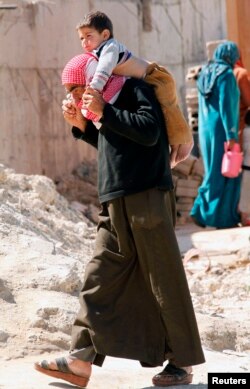LONDON —
A generation of Syrian children is greatly suffering amid the country's ongoing conflict, the United Nations children's agency said in a report published Tuesday.
Patrick McCormick, a UNICEF spokesperson, said, “We are seeing children first of all fleeing the country, not going to school, not having enough to eat. And we're seeing children surrounded by violence. We cannot afford for children to carry on experiencing this sort of trauma.”
Syria’s conflict has been raging for two years and UNICEF said nearly half of the four million people in need of aid inside Syria are under the age of 18. More than 500,000 are children under the age of five.
The agency said basic infrastructure and public services in Syria are being systematically destroyed, with damaged health centers and an education system that has nearly collapsed.
UNICEF estimates that one in every five schools has either been destroyed or is being used by displaced people seeking shelter.
McCormick said there is little sign of the conflict coming to an end. “It’s starting to remind me of ones that go on and on and on and on," he said. "So you do have a lost generation that just grow up and know nothing but violence - and become a cycle of that, perhaps perpetuating it in the future.”
UNICEF is calling for additional funds in order to deliver health care, water, sanitation and hygiene, education and protection for Syrian children.
But the agency said it is underfunded. So far it has received just 20% of the $70 million it says it needs to help women and children affected by the crisis.
McCormick said campaigns to raise money for political-based crisis - like that in Syria - are much less successful than for other crisis, especially natural disasters.
“It depends on the emergency, it depends on the country, how donors - and I'm not just talking about governments, I'm talking about the "man on the street," everybody - will react and reach into their pocket or not. And in this case Syria has been very, very difficult to raise money for,” he saod.
UNICEF and its partners have vaccinated 1.3 million Syrian children against measles, four million people have been provided with safe water, and more than 400,000 children and women have been given access to basic health services.
Patrick McCormick, a UNICEF spokesperson, said, “We are seeing children first of all fleeing the country, not going to school, not having enough to eat. And we're seeing children surrounded by violence. We cannot afford for children to carry on experiencing this sort of trauma.”
Syria’s conflict has been raging for two years and UNICEF said nearly half of the four million people in need of aid inside Syria are under the age of 18. More than 500,000 are children under the age of five.
The agency said basic infrastructure and public services in Syria are being systematically destroyed, with damaged health centers and an education system that has nearly collapsed.
UNICEF estimates that one in every five schools has either been destroyed or is being used by displaced people seeking shelter.
McCormick said there is little sign of the conflict coming to an end. “It’s starting to remind me of ones that go on and on and on and on," he said. "So you do have a lost generation that just grow up and know nothing but violence - and become a cycle of that, perhaps perpetuating it in the future.”
UNICEF is calling for additional funds in order to deliver health care, water, sanitation and hygiene, education and protection for Syrian children.
But the agency said it is underfunded. So far it has received just 20% of the $70 million it says it needs to help women and children affected by the crisis.
McCormick said campaigns to raise money for political-based crisis - like that in Syria - are much less successful than for other crisis, especially natural disasters.
“It depends on the emergency, it depends on the country, how donors - and I'm not just talking about governments, I'm talking about the "man on the street," everybody - will react and reach into their pocket or not. And in this case Syria has been very, very difficult to raise money for,” he saod.
UNICEF and its partners have vaccinated 1.3 million Syrian children against measles, four million people have been provided with safe water, and more than 400,000 children and women have been given access to basic health services.






